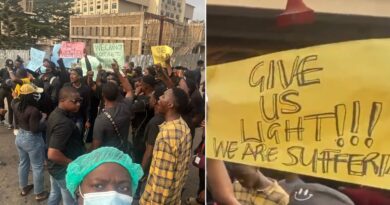Nigerians in Diaspora kick at Trump’s New Birthright Policy
Nigerians living abroad have criticised President Donald Trump’s decision to end birthright citizenship, which is a right guaranteed by the U.S. Constitution.
They pointed out that an executive order is not sufficient to change a constitutional provision and emphasised that the final decision would rest with the U.S. courts and the Supreme Court.
On his first day in office, Monday, President Trump signed an executive order aiming to end birthright citizenship, reversing policies from President Biden’s era. The order seeks to stop granting U.S. citizenship to children born in the country if their parents are in the country unlawfully or temporarily.
According to the order, the federal government will no longer issue citizenship documents for such children born after 30 days from its implementation.
This decision has sparked immediate legal challenges, with 22 Democratic-led states and civil rights groups filing lawsuits to block the order.
Mr. Ralu Ajekwe, a U.S. resident, commenting on the issue acknowledged the intention to protect national interests but emphasised the importance of evaluating the legality of the executive order.
He stated, “Is it in line with existing laws? Is an executive order enough to amend a constitutional issue? One thing I will tell you though is that a government exists to protect the national interest of the state, both in local and international relations.
”This means that it has to take a stand that aligns with its goals, values, and objectives. If Trump has banned citizenship by birth, the questions should be: What are his goals and objectives? Does it align with the interests and values of the American people?
He added, “Are Americans happy with the policy? Does it lead to the greatest happiness of the greatest numbers? If all the above is yes, then he is doing the right thing. Another thing I think we should look at is the legality of the policy.”
A Nigerian legal practitioner based in Canada who chose to remain anonymous criticised President Trump’s move, calling it mere “showmanship.”
He explained, “There are two things with Trump: one is grandstanding or showmanship for his base or supporters and another is what would be legal. There is a limit to executive orders.”
Referring to the 14th Amendment, the lawyer argued that Trump’s proposal introduces a new condition—parents’ temporary status or lack of permanent residency—as a factor for determining U.S. citizenship.
He highlighted the Constitution’s wording: “All persons born in the United States and subject to the jurisdiction thereof are citizens of the United States and of the State wherein they reside.” Can children of temporary residents not be subject to the jurisdiction of the US?
“There is an exception though. The children of people on the diplomatic mission are not usually citizens of the US (and Canada) due to their diplomatic immunity, privileges, conventions, and practices.
“I think that executive order will be challenged. It will be up to the US courts or Supreme Court to determine. If the court determines against Trump, those who lost their citizenship while the policy was in force will regain their citizenship.
He continued, “The judiciary will have a final say and as such, there are no full details on that immigration policy till the legal challenges are decisively determined by the courts. Anything else would likely be posturing and grandstanding.
“Now, as to the illegal migrants or undocumented migrants, which is also mentioned in the order, the constitution did not say their children can not be citizens. The overarching phrase: All persons born may work in their favour as well.
“Come to think of it, most of the undocumented migrants are trying hard to be subject to the jurisdiction of the US through their action or inaction to stay in the US, albeit illegally. Most are pleading with the US to grant them a stay. Can one safely argue that undocumented migrants are not subject to the jurisdiction?
See Also: Nigeria Makes A Bold Bid To Host The 2031 African Games
Peter Obiora, online editor at InvestAdvocate, who resides in the United States, commented: “It cannot work that way except they change the constitution on that. The Constitution supersedes any other executive order. So, before that can happen, it has to be changed in the constitution.
“There would be a barrage of lawsuits on this. He touted that idea the first time he came in and it was shot down; this time around, he’s back with it. But there’s no way Trump can stop birthright citizenship except through constitutional amendment. I don’t see him actualising this until his tenure ends.”
John Paul Nwafidelie, a resident of Canada, described the move as an effort to manage immigration into the United States.
He noted that Canada is considering a similar policy, but the process is being handled through its parliament.
Nwafidelie advised Nigerians seeking dual citizenship for their children to follow the proper procedures, especially in light of the new order.
He said, “My point is that Nigerians took advantage of birthright citizenship while it lasted. So, now that it has changed, people should follow the current policy to get it if they so desire.
”It worked well for foreign nationals but is no longer working because it gives citizenship to the wrong people who shouldn’t have been allowed to stay in the country due to crime and terrorism.
“So, it’s a way they want to control the immigrants into the country. Like I always said, no door is shut; it’s just a change in process. So, whoever wants it should be patient enough to go through the right path and still get it.”
Content Credit| Igbakuma Rita Doom
Picture Credit | https://nidcom.gov.ng/




